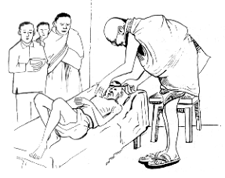
Some men changed their times...
One man changed the World for all times!
Comprehensive Website on the life and works of
Mahatma Gandhi
+91-23872061
+91-9022483828
info@mkgandhi.org

+91-23872061
+91-9022483828
info@mkgandhi.org
Gandhi looks at leprosy |
 The picture of Gandhiji nursing a patient suffering from leprosy is a well known one. Do you know the name of the patient? He is Parchure Shastri who was in Yeravada Jail in 1932, along with Gandhiji but was placed in a separate ward for leprosy patient prisoners. Gandhiji had requested the Superintendent for permission to see Parchure Shastri but the prevailing prison laws did not allow that. Thus Gandhiji started a chain of correspondence with him. While in prison Gandhiji started his epic fast for Harijans and when the Poona Pact was signed and he ended his fast, he immediately asked for Parchure Shastri to recite Mantras from Vedas and Upanishads. Some years later, in 1939, Parchure Shastri wrote to Gandhiji asking for his permission to come and stay in his Ashram at Sevagram and even before Gandhiji could reply he had arrived. Gandhiji was in a dilemma. Knowing that he was suffering from a highly infectious type of leprosy, he was debating within himself whether to allow him to reside in the Ashram where so many men, women and children were living and for whose health and welfare he was responsible. And yet, by turning him away he would be insincere to his own pronouncements. Gandhiji placed his predicament before the Ashramites at the morning prayers. They rose to the occasion, saying they were prepared to receive Parchure Shastri in their midst. A neat cottage was hurriedly put up close to Gandhiji's; he personally nursed him and supervised his diet. Parchure Shastri lived there for two years and recovered sufficiently to act as a priest at a marriage ceremony in Sevagram Ashram in 1940, at Gandhiji's special request. How is it that Gandhiji managed to find so much time, in the midst of all his preoccupations, to devote to the problem of leprosy? The answer is found in a moving incident, in his own home in Porbandar when he was barely thirteen years old. At that impressionable age he had come into close contact with a man named Ladha Maharaja who used to recite verses from the Ramayana to Gandhiji's sick father. Ladha Maharaja, it was believed, had been completely cured of leprosy by applying Bilwa leaves and regular recital of Ramayana. Such close contact with a man who had suffered from this dreaded disease had helped him overcome his fear of the same and instilled in him a life long concern for those suffering from this. Even while in South Africa, a beggar had come to his door in a highly advanced state of the disease. Gandhiji had dressed his wounds, given him food and made him stay as his guest. There are many such incidents throughout his life which express his compassion and tenderness towards leprosy patients. Courtesy: Gandhi Memorial Leprosy Foundation, Wardha |